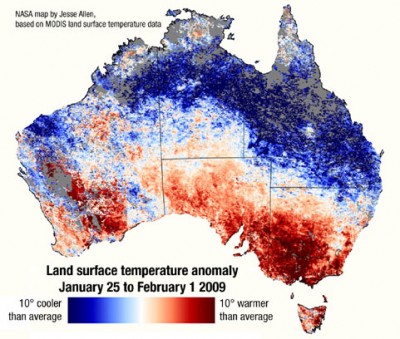No-one could have stopped the Victorian fires. Climate change is the principal cause; we need to assume that this isn’t a one-off event. [17 February 2009 | Peter Boyer]
Day after day of collapsing economies and dire predictions made a miserable start to 2009, but the utter devastation of the Victorian fires has put all that into perspective. Before the fires we thought we knew what bad news was. Now we know.

Southern Australia's extra hot weather leading up to the bushfires and cooler-than-average conditions in the north are graphically shown in this satellite-data map.
The impact of our economic woes is limited to humans – and given time, we who caused the problem can surely fix it. But on 7 February, not just our own hapless species but all animals and plants over much of Victoria felt the shock and awe of an unstoppable force.
Never before in this country have we had so stark a reminder of nature’s utter indifference to human life or suffering. News media prone to exaggeration about relative trivia struggled for words to describe a truly apocalyptic event.
In the wake of the fires came the finger-pointing. Besides arsonists, who can expect no sympathy, authorities came under attack for inadequate warning, or for wrongly encouraging people to stay with their homes, or for delaying their return after the fire had gone.
Whenever disaster strikes, governments and administrators are an obvious target. In our democracy we expect our leaders to be held accountable, just as we expect help from them in difficult times – and often there’s good cause for criticism.But Victoria’s wildfire devastation suggests that searching for flaws in the way authorities dealt with events on the day, though it may help some to feel better, won’t be much use for the future.
Our leaders like to present themselves as having things under control, but there are some situations – and the Victorian bushfires are a prime example – which are simply beyond human control.
This disaster is part of a much bigger, tougher problem for which everyone must take responsibility, and while it was unprecedented, all the evidence says that it’s a foretaste of things to come.
For nearly two decades, scientists have been advising that the impact of global warming on Australia will be severe. They have specifically said that while most of northern Australia will become wetter (as it has done over the past fortnight), southern Australia will become much drier.
They have also warned that extreme events, including storms and high temperatures, will become more frequent and more severe. Australians – and that includes Tasmanians – can expect more hot summer days and more record high temperatures.
Drier, hotter summers mean that wildfires will be more frequent and more severe. When higher temperatures bring increased rates of evaporation and rainfall is consistently below average, wildfires will burn more fiercely and spread more quickly, even in moderate winds.
With such an outlook, it’s as well to put aside standards of past wildfire events – when it may have been reasonable to expect people living in bushland to stay and protect their homes – and look to a future where this may not be possible.
The human and financial cost of fighting wildfires may in some future cases prove to be beyond us. It may turn out to be necessary for governments, communities and individuals, together, to provide wildfire shelters for people much as bomb shelters are provided in times of war.
Most of all, we need to keep reminding ourselves that it’s we who’ve caused our climate to change, and that while reducing carbon emissions won’t reduce wildfire threat for many decades, failing to do so will only make it worse. How many more fire disasters will it take to convince us of that?
